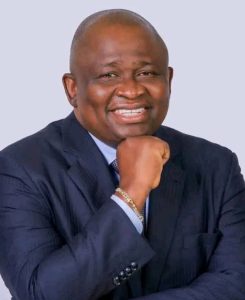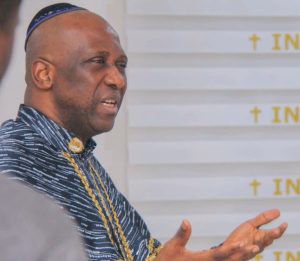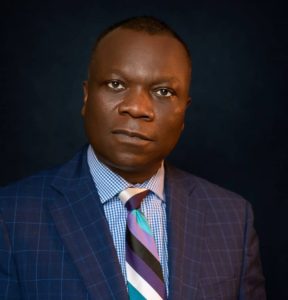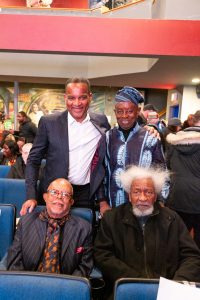BUILDING A GREATER NAVY AND OGALLA’S FOOTPRINTS* By Tolulope Adebayo
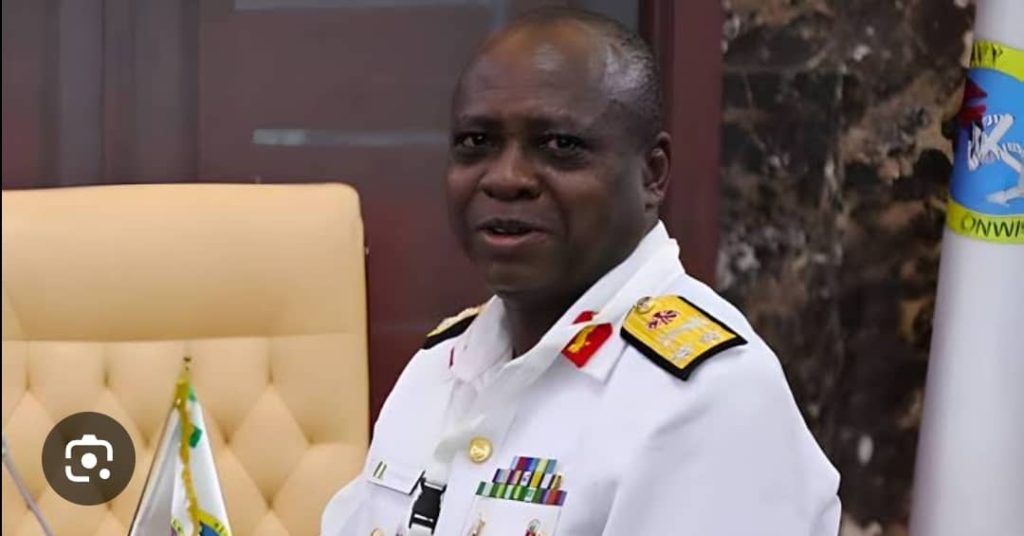
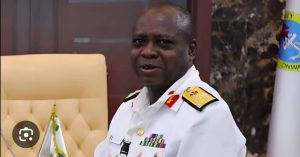
Vice Admiral Emmanuel Ikechukwu Ogalla is the Chief of Naval Staff, he was appointed to the position by President Tinubu in June 2023. A seasoned navigator, he is expected to lead the Nigerian Navy in manning Nigeria’s vast maritime frontier which stretches a formidable 84,000 nautical miles, with over 3,000 lakes and rivers, the former equating with a third of Nigerians landmass.
This herculean task demands a leader that is determined, disciplined, with a wealth of experience and exceptionally focused vision, to harness the potentials in both the Maritime Sector and develop the nation’s Blue Economy, who also appreciates the imperatives of building the capacity of the Nigerian Navy to secure its maritime environment, as well as extend it to the Gulf of Guinea
CNS Ogalla may not command all the salient qualities demanding of his formidable and highly demanding office. No one, even him nor President Bola Ahmed Tinubu who appointed him, genuinely expected that he possess such conspicuous qualities.
Ikechukwu simply came in unexpectedly, simply put the current CNS came on board as a dark horse. His emergence was greeted with mixed reactions. Not many believe in his capacity, and his capability to deliver just as the C-in-C knew. But today he has proven many wrong.
Ogalla has shown that, one’s ethnicity is not what is required to deliver on a job like this. He has proved that contrary to misconceptions about him, he is a man prepared for the job.
Under the leadership of CNS Ogalla, the Nigerian Navy maritime security made significant improvements in legitimate shipping activities due to reduction of crimes in Nigerian waters, leading to appreciable rise in oil production and progressive decline in oil theft and illegal oil bunkering activities.
Ogalla through the annual sea inspection exercise has made giant strides in positively impacting on the readiness for combat operations of the naval personnel, which also has exposed other maritime agencies to the benefits of interagency cooperation. This has led to positive rise in oil production as several companies have reported 100 per cent terminal factor.
The sustained presence of Nigerian Navy ships at sea, deployment of technology for surveillance, improved inter agency collaboration and international partnerships as facilitated by exercises such as DEIN ABAJI which translates to ‘Calm Waters’ in Kalabari dialect, has led to unprecedented breakthroughs as well as curb maritime threats in line with the statutory roles of the Nigerian Navy which include protecting the maritime environment for national economic prosperity, and supporting existing domestic and regional maritime security initiatives.
Ogalla utilized his comprehensive strategy; the Total Spectrum Maritime Strategy (TSMS), and his vast knowledge of the maritime domain and tactical operations to tackle maritime crimes and promote economic growth. This holistic agenda which includes the designation of Special Courts for Maritime Crimes, Advocacy Campaigns to enlist community support, and Socioeconomic Crime Prevention Strategies, also focuses on enhancing naval capabilities through fleet renewal, operational readiness, and infrastructural development, and the prioritization of human capital development through personnel welfare and motivation, manpower training, and youth and sports development has greatly impacted on the Nigerian Navy.
Part of his strategy of is to effectively implement a robust maritime stakeholders’ engagement and interagency cooperation. By implementing these measures, the CNS aims to safeguard Nigeria’s maritime interests, promote economic growth, and enhance regional stability. Through this robust confidence-building, partnership and interagency relationship dialogue, he initiates the various security outcomes within Nigeria’s maritime domain and the littorals, including land-based engagements in fulfilment of national interest. The synergy has led to intelligence sharing amongst various agencies such as NIMASA, NPA, NDLEA, NOSDRA, and NEMA, as well as many foreign bilateral meetings and talks with the American Chief of Naval Service, Operation (CNO), and also enhanced trust, confidence building, synergy and operational successes.
A strong believer in a highly motivated professional naval force, CNS Emmanuel Ogalla, set in various measures and alternatives aimed at maintaining and equipping a professionally competent and ethical naval force, which will leverage on all the elements of national powers to effectively defend Nigeria’s maritime area against all forms of threat and deliver the imperatives of national security.
In order to give action to his words, the CNS carried out various practical reforms and projects aimed at recapitalizing the Naval ship, one of such is the re-equipping of the Naval Shipyard Limited to construct and fabricate small boats, big vessels and other facilities of the Navy, has eliminated capital flight and encouraged the training and development of skilled manpower not just within the Navy but as a means to entrepreneurial development and self-employment.
This move has in no small measure reduced capital flight and enhanced, as well as encouraged the training and development of skilled manpower.
As part of his commitment and dedication to the welfare of his personnel, Vice Admiral Ogalla conducts frequent inspection and supervisory tours of the various Naval ships aimed at fostering closer ties, as well as establishing the welfare of the personnel. Those visits served as a morale booster and helped to motivate the personnel, as it equally becomes an avenue for having firsthand knowledge of the conditions of the personnel. The visit has been adjudged to greatly increase the morale of the officers and men, as well as a forum for a one-on-one with the CNS.
For instance, in one fell swoop operation, within three months, the Nigerian Navy recorded a debilitating breakthrough against the criminals, leading to the seizure of 95 wooden boats, 119 de-activated storage tanks refining ovens, 447 deactivated dugout pits, 120 deactivated Illegal Refining Sites, 13 seized fibre boats, 9 seized vehicles, 74 arrested suspects, and 14 arrested vessels including MT KALI, MT HARBOUR SPIRIT, MT SAISNIL, MV TOKITO, MT VINILLARIS and MT SWEET MIRI, among others.
Some of the arrested vessels include MT KALI, MT HABOUR SPIRIT, MT SAISNIL, MV TOKITO, MT VINILLARIS, and MT SWEET MIRI.
The Nigeria Navy under his watch, has shown avowed commitment to the ideals of the Tinubu Presidency, by supporting land operations in all the geopolitical zones of the country, winning the war against evil and ensuring a crime-free Nigeria through the strategy of Maritime Domain Awareness Capacity, he strategy has also compelled naval personnel to civility, and activated deterrent measures to curb negligence and unprofessional conduct of personnel but also provided all year-round situation awareness of Nigeria’s maritime domain extending to the limits of the Exclusive Economic Zone.
With the capitalization of 2 XSeaward Defense Boats (SDB); constructed locally, the various Platforms, thereby ensuring and supporting its anti-piracy, anti-CoT, anti-IUU and anti-illegal drugs, combined with the acquisition of 2nd Offshore Survey Vessels, 2 by 32m FPBs and helicopters (NNS CHALAWA, P196-Seaward Defense Boat, NNS ZUR P195 – Seaward Defense Boat and NNS OCHUZOR Survey Vessels and the delivery of 2 by 76m OPVs from Turkey, the Nigeria Navy remains the most dominant in the Gulf of Guinea (GoG) and the 4th largest in Africa.
Presently, under Vice Admiral Ogalla, the Nigerian Navy has over 50 capital ships and several hundreds of boats to cover the maritime space and internal waters. While the capital ships are used to patrol the sea, the small vessels carry out routine patrols also.
His non-kinetic approach has brokered several peace initiatives amongst communities and deepened community-military harmony within Nigeria’s Oil/Gas littoral area.
Not leaving out the welfare of the personnel, Vice Admiral Emmanuel Ogalla, has also demonstrated leadership and empathy by ensuring the construction of 50 units of 3 bedrooms, 128 units of 2 bedrooms and 120 units of 2 bedrooms apartments in Galadimawa, Asokoro Abuja, Lagos, Calabar and Port-Harcourt.
With an eye on sustainability, intellectual development and research, the Chief of Naval Staff on the 1st of June, 2024 launched the International Maritime Institute (IMION), an institution which will serve as a confluence for maritime discourse, the scintillation of ideas, and a vehicle for the articulation of maritime strategy on the African Continent.
With the launch of this crowning glory, the CNS intends to decimate, with a single shot, an institution which will also serve as a think-tank for maritime strategic thinkers, practitioners and allies with a far-reaching benefit of enhancing effective interaction, idea sharing and research into maritime strategic affairs affecting not only the Gulf of Guinea but the rest of the world, in such thematic areas as, maritime and ocean governance, maritime security, law enforcement, hydrography, blue economy, and climate change amongst others.
Under Ogalla’s visionary leadership, Nigeria’s war against oil theft has witnessed unprecedented success. His bold strategies, collaborative approach, and commitment to personnel welfare have transformed the Nigerian Navy into a formidable force. The Total Spectrum Maritime Strategy has yielded remarkable results, significantly boosting national security and contributing to global maritime stability. Ogalla’s efforts have solidified his legacy as a champion of maritime security and economic growth, earning the confidence of Nigerians and international partners alike.
It is instructive to note that the FALCON eye system of the Nigerian Navy is a state-of-the-art surveillance facility that incorporates various sensors located along the nation’s enormous coastline, such as Radars, long-range Electro Optic Systems with thermal or night vision capability, Automatic Identification System receivers, Weather Stations and marine Very High-Frequency Radios for communication.
The device consists of over-the-horizon radars with a range of 200 miles, long-range electro-optical systems with a range of 30 miles, and automatic identification system (AIS) receivers. These are linked to three regional control centres and a network operations centre to provide real-time situational awareness of the country’s waters.
The integration of these technologies has led to the generation of real-time situational awareness of the activities of vessels in the Nigerian maritime domain and some selected parts in the Gulf of Guinea.
Presently, the deployment of technology has assisted in attaining real-time aerial surveillance. Drones equipped with high-resolution cameras and sensors can provide continuous aerial surveillance of pipelines, oil facilities, and surrounding areas, capturing real-time data and visual feeds. Drones can capture detailed images and videos, allowing for the identification of unauthorized activities, potential threats, and illegal taps on pipelines, all of these enhance rapid response.
In the area of criminal detection, prevention and deterrence, with detection being the key reason for the deployment of the technology, early detection and deterrence can be easily and promptly achieved. Early detection, advanced sensors and AI algorithms are now effectively and efficiently used to detect anomalies such as leaks, illegal taps, and unauthorized movements along pipelines thereby preventing wastages and the dangers of scooping and its potential risk.
Thermal imaging by drones equipped with thermal cameras is also used to identify heat signatures from illegal activities or equipment tampering, even in low visibility conditions such as nighttime or dense vegetation, this has become a potent tool for deterrence, while the physical visible presence of drones also acts as a deterrent to potential thieves, reducing the likelihood of thefts. While in flight, drones programmed to send automated alerts can automatically alert security personnel and local authorities upon detecting suspicious activities, enabling rapid intervention.
The deployment of innovative mandatory of the technology has led to an unprecedented high level of safety for all personnel and minimization of access to hazardous areas, thereby reducing the risk of injury or exposure to toxic substances and dangerous situations including armed attacks by oil thieves.
Instead Naval personnel can now monitor and respond to incidents from a safe distance, enhancing overall safety and minimizing direct human involvement.
All these leads also to overall cost efficiency, the strengthening of the operational capacity of the Navy and the enhancement of its capability to keep personnel abreast of global trends relating to evolving technological advancements in the maritime industry, as well as maintain a competitive edge during operations.
Aside, the use of AI has greatly improved the Nigerian Navy’s decision-making processes, such as predicting the most fuel-efficient way to operate a vessel and has also affected the ship’s navigation system, radar operations or threat-detection systems to help operators’ process information faster, effectively respond to a range of maritime threats such as illegal, unreported and unregulated fishing (IUU); drug smuggling; and piracy, eliminating the loss in revenue suffered annually by Nigeria of about $70 million to IUU fishing perpetrated by a host of foreign fleets, mostly Chinese.
Part of the achievements of the automatic mode is that the CMS can detect a target and identify, classify and prioritize targets before deploying weapons, although people are involved in decisions about when and how to use weapons.
As part of another landmark breakthrough, the CNS has established an overarching control facility at Naval Headquarters in Abuja. The Command-and-Control Centre is filled with television screens on one wall, directly faced by at least a dozen individual workstations for monitoring the sensors.
The Command-and-Control Centre is to enable the Nigerian Navy generate a comprehensive intelligence picture of activities within the maritime environment. This can thereafter be analyzed in appropriate cases, dispatching a Nigerian Navy ship for interdiction, investigation, and/or subsequent arrest of erring vessels.
The various operations with clear mandate to tackle Crude Oil Theft (COT), Illegal oil bunkering, pipeline vandalism and a host of other criminalities on the nation’s maritime area have significantly disrupted oil thieves and vandals, leading to the recovery of substantial amounts of stolen products and the dismantling of illegal refining sites, with the recovery of massive quantities of stolen products, the dismantling of Illegal Refining Sites, arrest of suspects, and seizure of stolen products, are clearly eloquent testimonies of a determined result-oriented leader.
Today, the Nigerian Navy is at its highest state of operational readiness and ranks as the 4th largest Navy in Africa. Vice Admiral Emmanuel Ikechukwu Ogalla’s footprints are clearly on the rock of time, as a clear case of not judging a book by its cover.
Adebayo is a maritime communication expert based in Abuja.


